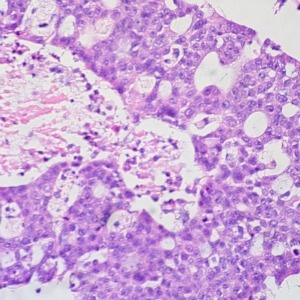Most late cancer diagnoses are due to patients not presenting to their GP in time rather than delays in being referred or undergoing investigations, NICE’s chief clinical director has told NHS managers, charities and patient groups.
Professor Mark Baker, director of the centre for clinical practice at NICE, said public education and awareness about cancer was ‘a problem’ and that ‘the habitual late presentation and diagnosis’ in the UK ‘is not primarily caused by GPs, it’s primarily caused by patients presenting late with symptoms’.
Professor Baker’s comments come as Cancer Research UK launches a nationwide campaign to encourage patients to see their GPs as soon as they see ‘unusual’ symptoms, as part of its work on improving early diagnosis.
NICE recently introduced new guidelines that lowered the risk threshold at which GPs should refer for investigations for suspected cancer.
However, speaking at a Westminster Health Forum event on cancer last week, Professor Baker said this was ‘not the answer’ to addressing the gap in cancer survival between the UK and the rest of Europe and that public awareness was ‘at least as important’.
Professor Baker said: ‘Targeting GP referrals is important, but not the answer. Targeting patients’ expectations, [their] understanding of what is important and also their belief systems about survival potential from cancer is at least as important as anything we do inside the operation of the NHS.’
He added that cancer symptom awareness publicity campaigns such as the Government’s Be Clear on Cancer could be effective in the short term, but community based groups including the third-sector had an important role to play in informing the public and reinforcing such messaging.
Cancer Research UK’s national campaign – which was piloted earlier in the year in the north of England – involves national TV and cinema adverts, as well as billboard posters, digital adverts and social media activity.
The charity said the pilot campaign led to more people reporting that they had checked their body for any unusual or persistent changes, made a GP appointment or spoken to friends or family about cancer within the last month.
Some of the Government’s Be Clear on Cancer campaigns have come under criticism from GP leaders for being too broad in their messaging and potentially causing anxiety to patients, such as the upper gastrointestinal cancer publicity campaign around symptoms of heartburn.
However, Dr Andrew Green, chair of the GPC’s clinical and prescribing subcommittee, welcomed the new Cancer Research UK campaign which he said ‘got the balance about right’ between self-care and early presentation.
Dr Green said: ‘I think this is a thoughtful and welcome resource for patients, and I particularly like the idea of alerting patients to the importance of being aware of changes in their bodies, this is often the most important aspect of a patient’s presentation.
‘Also to be welcomed is the sensible advice to avoid ritualistic and regular breast or testicular self-examination, and the mention of the harms that can be produced by these.’
Dr Green added: ‘All GPs will remember patients who come to an emergency appointment convinced that they have cancer with a symptom which has been present for years or even decades, but they ignore new and important symptoms.’
Pulse October survey
Take our July 2025 survey to potentially win £1.000 worth of tokens















